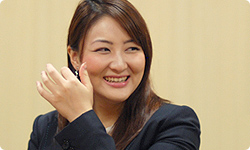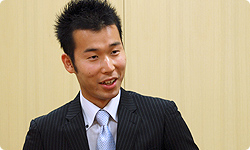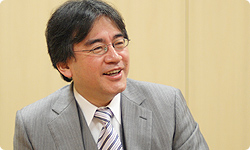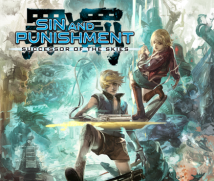5. Increased Difficulty
Thanks for your patience, Hattori-san and Matsushita-san. You’re both staff from Nintendo, when did you join development?
I was surprised, but when Hattori-san saw the proposal for Sin and Punishment that I had received from Treasure, she said she wanted to work on it.
Huuuh?!
Really?! That’s the first I ever heard about it!
To be honest, I never imagined Hattori-san would volunteer to work on this.
I’m a little shocked, too.
(laughs)
Having participated in the past “Iwata Asks” for Iwata Asks Nintendo presents: Style Boutique12, it seems like you have quite a dynamic range! (laughs) 12Nintendo presents: Style Boutique: A fashion-styling simulation game released for the Nintendo DS in Europe in October 2009.
(laughs)
You really did ask to be involved?
Yes. I volunteered. I think it’s the first time since joining the company that I’ve done that.
I think she must have been incredibly interested in the game world of Sin and Punishment.
Ah, I see. Did you play the original game?
It was too difficult on the Nintendo 64, so I couldn’t.
(makes a pained expression)
(laughs) So Treasure could have said, “Anyone who can’t do this can’t be on our team!” and shut you out! (laughs)
That’s right! (laughs) I was extremely interested by the art on the packaging, the game world and what people around me were saying, but I thought I couldn’t join. It looked interesting, so I was really frustrated.
I see. Are you happy to hear your game could generate such interest, Suzuki-san?
And from a woman no less! (laughs)
(laughs) I was frustrated, and also thought it was too bad more people couldn’t enjoy it. I thought maybe we could, not make it shallower exactly, but make it a little more approachable.

Keep the depth, but make it easier to tackle. Make it open to first-timers.
Exactly. It’s the same as with Style Boutique. That game is really deep.
After you joined the team, during the final adjustments, the game became more approachable, didn’t it?
Yes. I wanted to bring the same unintimidating atmosphere to Sin and Punishment as well.
I see. How did you become involved, Matsushita-san?
I wasn’t officially involved at first. I had only tried out the game once it reached a certain stage. But when they went to give Treasure some feedback, I just happened to be in Tokyo.
And we said, “Come join us!”
I went with them, and Yamagami-san introduced me as part of the team. As we were talking everything over, I actually came to be on the team! (laughs)

(laughs)
He was a big help. Matsushita-san knows a lot about shooting games, so it was great to have someone like him look at the game.
Matsushita-san could play the game at the uppermost limits, and Hattori-san could handle the more newcomer-friendly aspects, so the team possessed great balance.
Hattori-san, what issues did you run across?
First I nailed down certain basic elements by making a solid tutorial and adjusting the difficulty to newcomers. As I worked, however, I thought perhaps we shouldn’t lower the difficulty without putting sufficient thoughts into the consequence.
If you did, it could fundamentally undermine the game.
That’s right. The original game has lots of fans, as does Treasure. There were certain elements of the games that are appreciated by them, which I wouldn’t want to change a bit.
Shooting games are a major example of a game genre that was standard and played by lots of people for a while but saw a shrinking fan base as many players were left behind.
That’s right.
All the people who were once enjoying shooting games hardly ever play them anymore, but many of them would say they actually like them, so you wanted to make it easier for those kinds of people to play this game, is that right?
Yes. I wanted them to enjoy playing it. And at the very least I wanted to avoid them being unsatisfied or getting beaten without ever understanding what was going on. I think it’s the kind of game that is fun to learn and play and gradually improve at, so in my talks with Treasure, I mostly focused on aspects of the game that didn’t feel good, like moving on without ever really knowing what’s hitting you.
Nakagawa-san, what did you think when Nintendo brought these concerns to you?
I had really worked hard at the original game, so I thoroughly studied to be able to tell what a reasonable difficulty level would be.
Because you had fully discussed it with Yamagami-san?
Yes. But this time as well, the development staff consists largely of hardcore gamers. They’d mostly been developing for the Nintendo GameCube controller, which they’re most used to, not the Wii Remote.
I see.
So we were making the game to be how we like games, and it was really difficult.
In true Treasure style. (laughs)
I was looking over their shoulders and thinking, “Nintendo’s gonna make us change this later on…” If I had said anything, though, it would have got their backs up, so I waited for Nintendo to do it.
Because you didn't want to say it yourself, you let us do the dirty work! (laughs)

That’s right. But the feedback was the exact opposite!
Huh?
You guys said, “It’s too easy! What’s the deal?!”
(laughs)
They said, “The enemy gets wiped out in no time.” When I said, “But it’s supposed to be really difficult,” they said, “Fans will never approve of something so easy.”
We said that? To Treasure?
Right. It turns out that with the Wii Remote it’s easier to aim, so you totally clean house.
Oh, I see.
The Wii Remote is particularly suited to shooting.
That’s why it was easy to defeat the enemies. But did you actually tell Treasure, of all companies, to make it more difficult? (laughs)
Yes. During the last stage of development.
I had voiced my concern over the fact that even I could clear it without losing once. (laughs)
Now that certainly is surprising! (laughs)
In the original game, you couldn’t aim at both left and right opponents at the same time. But with the Wii Remote, you can shoot to the right, and then immediately shoot to the left, so you can almost simultaneously target all enemies on the screen. We needed to make adjustments for the controllers.
But it isn’t easy to adjust the difficulty balance. Some players want to use the Wii Remote, some want to use the Nintendo GameCube controller, and the game is also compatible with the Classic Controller.
In the end, we created places where the Wii Remote would be most advantageous, and places where the Nintendo GameCube controller or the Classic Controller would be most advantageous, deciding location by location within the game. So, played as a whole, whichever controller you use, it’s fun. But if you were to change controllers for each location - to the Wii Remote, for example - you might be able to seize the advantage anywhere.
Well, if you did that, it wouldn’t be much fun. (laughs) But it really surprises me to hear you say that Nintendo told Treasure to make it more difficult. If it weren’t for “Iwata Asks,” I’d never have known!
(laughs)
